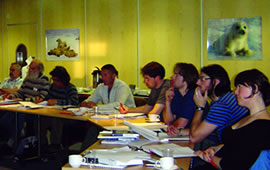Training Course Background

Scanning Ocean Sectors is established as a professional and premium training company for Marine Mammal Observer /Marine Fauna Observer and Passive Acoustic Monitoring Operator training courses internationally.
Our training courses are about ensuring professionalism and high standards of knowledge within the industry. Our highly experienced staff facilitate private training courses to students in a classroom environment and online, attaining new theoretical and practical skills and competencies on an international level.
Scanning Ocean Sectors ensures that the vocational, practical skills and knowledge relate to the specific useful competencies. Our training forms the core background information and provides the backbone of content to support students in the field.
In addition to the core training required for this profession, we provide additional advanced training and specialised training for specific hard and software equipment where required.
Continuous support is provided to all our training students from the moment they qualify and unlike other courses, we offer the legal refresher course every 4 years. Industries today recognise the need to continue training beyond initial qualifications, to maintain, upgrade and update skills throughout an employee’s working period. We can provide this professional development for every person who is trained by our company, please ask for a quotation.
The private courses take place in a fully equipped classroom which has the advantage of allowing people to step away from work and concentrate more thoroughly on the training. All students use the tools, equipment, documents and materials that they are expected to use as a qualified professional.
Our training has the specific goals of improving one’s capability, capacity and performance. Each student who has passed our training is graded to ensure a prospective client/employer knows the dedication and performance of each trainee.
The practical unit of “on-the-job training” has a general reputation as being the most effective for vocational work, so this is exactly what we do. Students are in a simulated work environment and must respond to each situation we put their way; this is assimilated in the classroom and at sea, each student is carefully monitored throughout this training process and assessed accordingly. The mitigation training component is crucial regarding the implementation and effective mitigation measures at sea.
We provide on request from your HR department, a training report for each individual student to ensure they have thorough knowledge and understanding of the work situation they will be placed in.
We do not discriminate against anyone wishing to become a Marine Mammal Observer/Marine Fauna Observer/Passive Acoustic Monitoring Observer. However, we will issue each MMO/MFO/PAMO with a certificate that has a date of competency and once they have proved they have worked for 5+ years in the industry as a new MMO (nMMO) we will issue them with a Certificate of Experience.
Abbreviations for our training Courses:
nMMO New Marine Mammal Observer
nPAMO New Passive Acoustic Monitor Operator
nMFO New Marine Fauna Observer
nMMOf New Marine Mammal Observer Facilitated
nPAMOf New Passive Acoustic Monitor Operator Facilitated
nMFOf New Marine Fauna Observer Facilitated
PSO Protected Species Observer
AMMO Australian Marine Mammal Observer
PPC/MMO Pre Mobilisation and Practical Course/MMO
PPC/PAMO Pre Mobilisation and Practical Course/PAMO
rMMO Refresher Course Marine Mammal Observer
MMO/JNCC JNCC Upgrade course for the MMO course
nzMMO New Zealand Marine Mammal Observer
XpMMO Experienced Marine Mammal Observer
XpMFO Experienced Marine Fauna Observer
XpPAMO Experienced Passive Acoustic Monitor Operator
auSB Australian Seabird
Our Training Courses
| Course ID | Course Name | Type | |
|---|---|---|---|
| MMO | Marine Mammal Observer | Classroom | VIEW MORE |
| PAMO | Passive Acoustic Monitoring Operator | Classroom | VIEW MORE |
